|
|
|
Sort Order |
|
|
|
Items / Page
|
|
|
|
|
|
|
| Srl | Item |
| 1 |
ID:
132395
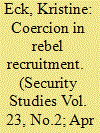

|
|
|
|
|
| Publication |
2014.
|
| Summary/Abstract |
Previous research on rebel recruitment has focused on the economic and social incentives groups used as enticements but has overlooked the question of why many armed groups recruit using coercion. The puzzle is why coercion occurs despite its alienating civilian populations and being costly in terms of organizational and military effectiveness. I suggest that recruitment is a dynamic process and that groups are likely to shift recruitment strategies depending on the exigencies of the conflict. In particular, the exposure of the group to military and economic shocks accompanied by shortened time horizons should lead to increasingly coercive recruitment. Whether forced recruitment is a durable solution for a group in the long run is likely to be contingent upon the group's ability to induce a high level of compliance from the individual at a low cost. Further, in order to circumvent costs vis-à-vis the civilian population, the group must be able to restrict defection to the government and the out-migration of the civilian population. Three narratives from Nepal, Ethiopia, and Sierra Leone are provided both to illustrate the arguments and to probe the scope conditions. The article concludes that understanding why and when rebel groups use forced recruitment has vital security implications for the countries in which armed conflict takes place.
|
|
|
|
|
|
|
|
|
|
|
|
|
|
|
|
| 2 |
ID:
089039
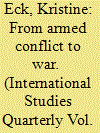

|
|
|
|
|
| Publication |
2009.
|
| Summary/Abstract |
This article presents a new line of inquiry into ethnicity and armed conflict, asking the question: are conflicts in which rebels mobilize along ethnic lines more likely to see intensified violence than nonethnically mobilized conflicts? The article argues that the ascriptive nature of ethnicity eases the identification of potential rebels and facilitates a rebel group's growth, leading to an increased risk for war. This proposition is empirically tested using a Cox model on all intrastate armed conflicts 1946-2004; the results show that ethnically mobilized armed conflicts have a 92 percent higher risk for intensification to war. In extending the analysis, the study finds that the vast majority of conflicts intensified in the first year, but for every year a low-scale conflict remained active thereafter, the risk of intensification increased, peaking around year 12.
|
|
|
|
|
|
|
|
|
|
|
|
|
|
|
|
| 3 |
ID:
112415
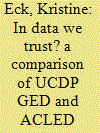

|
|
|
|
|
| Publication |
2012.
|
| Summary/Abstract |
In recent years, several large-scale data-collection projects have produced georeferenced, disaggregated events-level conflict data which can aid researchers in studying the microlevel dynamics of civil war. This article describes the differences between the two leading conflict events datasets, the Uppsala Conflict Data Program Georeferenced Events Dataset (UCDP GED) and the Armed Conflict Location Events Dataset (ACLED), including their relative strengths and weaknesses. The aim of the article is to provide readers with some guidelines as to when these datasets should be used and when they should be avoided; it finds that those interested in subnational analyses of conflict should be wary of ACLED's data because of uneven quality-control issues which can result in biased findings if left unchecked by the researcher. The article concludes that those interested in non-violent events such as troop movements have only ACLED to choose from, since UCDP has not coded such data, but again warns researchers to be wary of the quality of the data. Finally, while the creation of these datasets is a positive development, some caveats are raised in relation to both datasets about the reliance on media sources.
|
|
|
|
|
|
|
|
|
|
|
|
|
|
|
|
| 4 |
ID:
112781
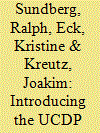

|
|
|
|
|
| Publication |
2012.
|
| Summary/Abstract |
This article extends the Uppsala Conflict Data Program (UCDP) by presenting new global data on non-state conflict, or armed conflict between two groups, neither of which is the state. The dataset includes conflicts between rebel groups and other organized militias, and thus serves as a complement to existing datasets on armed conflict which have either ignored this kind of violence or aggregated it into civil war. The dataset also includes cases of fighting between supporters of different political parties as well as cases of communal conflict, that is, conflict between two social groups, usually identified along ethnic or religious lines. This thus extends UCDP's conflict data collection to facilitate the study of topics like rebel fractionalization, paramilitary involvement in conflict violence, and communal or ethnic conflict. In the article, we present a background to the data collection and provide descriptive statistics for the period 1989-2008 and then illustrate how the data can be used with the case of Somalia. These data move beyond state-centric conceptions of collective violence to facilitate research into the causes and consequences of group violence which occurs without state participation.
|
|
|
|
|
|
|
|
|
|
|
|
|
|
|
|
| 5 |
ID:
133701


|
|
|
|
|
| Publication |
2014.
|
| Summary/Abstract |
Common notions about the source of communal land conflict in Africa have long explained it as growing out of conditions of environmental scarcity. This article argues instead that the institutional structure of the legal system is central to understanding which countries are prone to experience communal land conflict. When competing customary and modern jurisdictions coexist in countries inhabited by mixed identity groups, the conflicting sources of legal authority lead to insecurity about which source of law will prevail. Because the source of law is contested, conflict parties cannot trust the legal system to predictably adjudicate disputes, which encourages the use of extrajudicial vigilante measures. Using new data on communal violence in West Africa, this argument is examined for the period 1990-2009. The results show that in countries where competing jurisdictions exist, communal land conflict is 200-350% more likely. These findings suggest that researchers should consider the role of legal institutions and processes in relation to social unrest and collective violence
|
|
|
|
|
|
|
|
|
|
|
|
|
|
|
|
| 6 |
ID:
179261
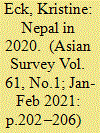

|
|
|
|
|
| Summary/Abstract |
Internal party rifts in the Nepali government preoccupied leaders, who squandered opportunities to prepare a coherent response to the COVID-19 pandemic. The pandemic resulted in a four-month lockdown, with widespread economic and social consequences. The government’s response to criticism was to propose legislation restricting citizens’ rights, prompting accusations of creeping authoritarianism. Continued tensions along Nepal’s borders led to escalated rhetoric. The crises of 2020 exacerbated existing problems with governance, social inequality, and poverty.
|
|
|
|
|
|
|
|
|
|
|
|
|
|
|
|
| 7 |
ID:
185214
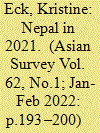

|
|
|
|
|
| Summary/Abstract |
The COVID-19 pandemic hit Nepal harder in 2021 than in the previous year, resulting in thousands dead, millions of livelihoods lost, food access constricted, educations upended, and social and economic devastation. In the midst of this, political leaders were preoccupied with power politics, leaving the country ill-equipped to manage the COVID-19 crisis. Fragile democratic institutions and norms were undermined by the inability of leaders to prioritize governance. Environmental problems, an economic downturn, and continued human rights violations further exacerbated the country’s woes.
|
|
|
|
|
|
|
|
|
|
|
|
|
|
|
|
| 8 |
ID:
158208
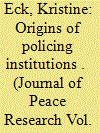

|
|
|
|
|
| Summary/Abstract |
This article examines the impact of colonial-era armed conflict on contemporary institutions. It argues that when British colonial administrators were faced with armed insurrection they responded with institutional reform of the police, and that the legacy of these reforms lives on today. Violent opposition prompted the British colonial administration to expand entrance opportunities for local inhabitants in order to collect intelligence needed to prosecute a counterinsurgency campaign. This investment in human capital and institutional reform remained when the colonial power departed; as a result, countries which experienced colonial-era conflict have more efficient policing structures today. I demonstrate how this worked in practice during the Malayan Emergency, 1948–60. Archival data from Malaysia show that local inhabitants were recruited into the police force in greater numbers and were provided with training which they would not have received had there been no insurgency. This process was consolidated and reproduced upon independence in path-dependent ways. To expand the empirical domain, I statistically explore new archival data collected from the UK National Archives on police financing across colonial territories. The results show that armed insurgency during the colonial era is associated with higher percentages of police expenditure during the colonial era and higher perceived levels of contemporary policing capacity.
|
|
|
|
|
|
|
|
|
|
|
|
|
|
|
|
| 9 |
ID:
181859
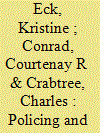

|
|
|
|
|
| Summary/Abstract |
The police are often key actors in conflict processes, yet there is little research on their role in the production of political violence. Previous research provides us with a limited understanding of the part the police play in preventing or mitigating the onset or escalation of conflict, in patterns of repression and resistance during conflict, and in the durability of peace after conflicts are resolved. By unpacking the role of state security actors and asking how the state assigns tasks among them—as well as the consequences of these decisions—we generate new research paths for scholars of conflict and policing. We review existing research in the field, highlighting recent findings, including those from the articles in this special issue. We conclude by arguing that the fields of policing and conflict research have much to gain from each other and by discussing future directions for policing research in conflict studies.
|
|
|
|
|
|
|
|
|
|
|
|
|
|
|
|
| 10 |
ID:
160417
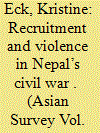

|
|
|
|
|
| Summary/Abstract |
This article shows that the statistical correlation between poverty and violence during the conflict in Nepal (1996–2006) is unlikely to be explained by grievances or low opportunity costs among the poor, but is better explained by considering the rebels’ strategy. This underscores the importance of validating arguments from statistical studies.
|
|
|
|
|
|
|
|
|
|
|
|
|
|
|
|
| 11 |
ID:
141186
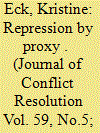

|
|
|
|
|
| Summary/Abstract |
Why do regimes delegate authority over a territory to nonstate militias, in effect voluntarily sacrificing their monopoly over the use of violence? This article argues that two factors increase the probability of states delegating control to a proxy militia, namely, military purges and armed conflict. Military purges disrupt intelligence-gathering structures and the organizational capacity of the military. To counteract this disruption, military leaders subcontract the task of control and repression to allied militias that have the local intelligence skills necessary to manage the civilian population. This argument is conditioned by whether the state faces an armed insurgency in a given region since intelligence, control, and repression are needed most where the state is being challenged. This hypothesis is tested on unique data for all subnational regions within Myanmar during the period 1962 to 2010 and finds that proxy militias are more likely to be raised in conflict areas after military purges.
|
|
|
|
|
|
|
|
|
|
|
|
|
|
|
|
| 12 |
ID:
181083
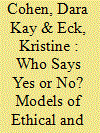

|
|
|
|
|
| Summary/Abstract |
The ethical risks inherent in student research on political violence that involve human participants are myriad. Undergraduate and master’s students face constraints that are different than those for many doctoral students and faculty researchers, and it is the responsibility of educators and academic institutions to ensure that students engage in ethical practices and to mitigate risks. This article focuses on formal mechanisms of oversight. Drawing on discussions with colleagues across the globe, we describe how institutions can design oversight mechanisms to manage student research. We present five distinct models for how ethical oversight of student research is provided in academic programs around the world, considering the costs and benefits of each model. The article concludes that whereas the creation of oversight systems can seem daunting, it is useful to start small—indeed, moving from no oversight to some oversight is a significant improvement. Programs and academic units then can build on these early efforts, experiment with other systems, and eventually develop a system that is adapted to an institution through iterative improvements based on student and faculty experiences.
|
|
|
|
|
|
|
|
|
|
|
|
|
|
|
|
|
|
|
|
|